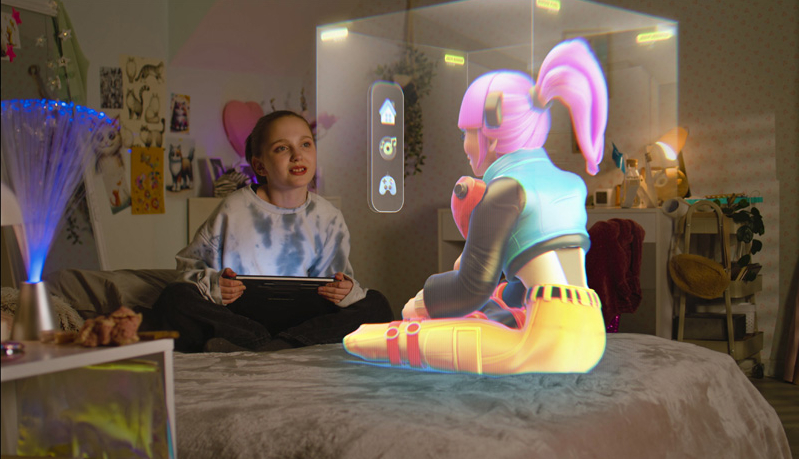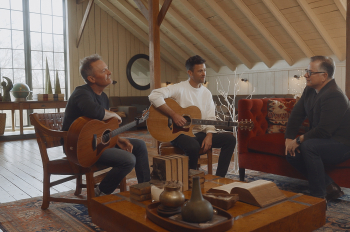
Companion /kəmˈpæn.jən/ noun
- one that keeps company with another
- one that is closely connected with something similar
- one employed to live with and serve another
This is the pretty standard definition of “companion” in the Merriam-Webster dictionary. It speaks to ideas that my school embraces, culminating in a theme of connection. All of the definitions reflect a bond that is human; one that requires effort and commitment—in essence, a relationship that is real. And within a teenage context, I cannot think of a more appropriate example than a set of loving parents.
Teens interact with characters or personas who replicate a “friend”.
But keep searching and various contemporary definitions emerge. One reads: digital companion and comes with the tangy definition, “chatbot apps powered by artificial intelligence, designed to simulate personal relationships through human-like conversations. The conversations can be via text or spoken word.” These “public-facing” chatbot apps differ from something like ChatGPT, in that, here, teens interact with characters or personas who replicate a so-called “friend”. In essence, they are AI companions.
Character.AI allows customizable characters and avatars that teens may generate themselves. A very cursory search reveals similar AI sites: Nomi, Replika, Talkie.ai are all public-facing, companion-style AI chatbots designed for personal interaction rather than a standard information search.
It is menacing to see the kinds of online worlds inhabited by over 70% of teenagers.
And with the slip of a few keys, you can find Companion AI—here, you either have the option of creating “your dream AI girl” or speaking to a bot called “ren” or “kai”. Whichever way, it is menacing to see the kinds of online worlds inhabited by over 70% of teenagers.
All of the owners of these companies publish how deeply committed they are to enhancing human connection or how their mission is to support emotional well-being by promoting the dignity of every individual. Their promises sound almost as authentic as the chatbots they administer. But they do not care, and parents and teens need to know that.
Our children inhabit a world where the definition of words has changed. At the mention of “companion,” I can almost guarantee that a teenager’s first thought would be the diluted, online version of a synthetic, “public-facing” chatbot.
They feed them until the robot finds an algorithm suitable to your teen’s fancies.
On the surface, it seems fun. But that changes when we realize these are our teenager’s new best friends. Here, not only do our children speak to them, but they feed them until the robot finds an algorithm suitable to your teen’s fancies. Teens are taught all sorts of things, from sex to the meaning of life. Before long, they become part of the statistics.
In my nation, an AI chatbot called Self-Cav provides young South Africans with 24/7 information on sex, HIV, and self-harm. It is difficult to find a site more ill-designed to supply such vital information to impressionable teens. And with teenagers seeking all forms of validation, sites like these (exclusively positive and often affirming risky behavior) carry enormous emotional clout.
It is easy to see why... so many teens are suffering with anxiety and depression.
Add to this a frontal cortex that is only just developing, and it is easy to see why, sadly, so many teens are suffering with anxiety and depression.
Why mention the frontal-cortex? Because in the teenage brain, studies of this region reveal that teens feel first, think second, and leave the evaluation of truth and long-term consequences to last. In other words, at this age feelings become truth and what is taught to them by these self-generated chatbots too easily becomes law.
Gone are the days of searching for true, lived, or validated wisdom or sidling up to a parent to ask for help. Teens may now inhabit a world where feeling is primary and where, in times of difficulty, they can simply generate a supposed remedy.
Given the stats, the contemporary version of companionship is far more ubiquitous than we think. A recent film is even called Companion and, unsurprisingly, it plays out the “what if” of a human-like android going haywire. I couldn’t find a more apt review than the first I read: “an empty sci-fi thriller".
The AI companions available to our teens are... empty
The AI companions available to our teens are just that—empty. And while the present effects are worrying enough, it is devastating to think of the impact this online reality will have on a teen’s possibility for true love, true relationship, and eventually even marriage.
How does an imperfect human being compare to a puppet that does everything you want? It is sad to think that teens may never grow to appreciate the nuance of imperfection, nor discover the value of patience as the bedrock of real love.
A few months ago, our school went on a teen youth camp. At the end of the camp, the forty or so students wrote a letter describing what they wanted from God. The letters were incredibly moving, not least because they were written in the moment and thus straight from the heart.
Our youth want peace and freedom, and they deeply desire a connection with a being who is personal and whose presence is tangible.
Mostly anonymous, the letters were a mixture of encouragement and heartrending. And the verdict? More than we know, our youth want peace and freedom, and they deeply desire a connection with a being who is personal and whose presence is tangible. Even more than desire, there is an urgency for connection, a longing to be free and to live in a world of hope.
They do not want chatbots. They want reality. They desire commitment; they desire truth—both in the physical here and now and spiritually. Yet the synthetic worlds they’re allowed to inhabit give them nothing of the sort.
The quick-fix culture of eager chatbots delivers them easy peace without sacrifice. Sadly, the world where peace was once inherited through a state of being is being swallowed by a present belief that it should manifest from a heartfelt wish. No longer can we nod at “it’s just what our kids at this age are exposed to” or “times have changed.”
We must not pander to these online genies.
Sure, it is true that times have changed. But that doesn’t remove our need to be vigilant. In fact, it only strengthens this need. I am not proposing frantic searching and panicking. But as parents (the real authority in our children's lives) we must not pander to these online genies. Furthermore, we cannot stop at removing the danger without providing the antidote.
Make the effort to do two or three activities that remove all online media and encourage real, live interaction.
I encourage all parents to spend valuable time with their children this holiday season. It is understandable that parents work, but make the effort to do two or three activities that remove all online media and encourage real, live interaction—a trip to the museum, a walk in the park, or a board game. Here, at least, we can rely on the adage: quality over quantity.
Whenever we can, let’s engage with our children and remove the nonsense that feeds their minds. In essence, let’s make them believe that we are their true companions, and fight for the privilege of playing this role.
As I chat with students, there are more than a few discussions that give me a glimpse into the passion they have for life. Pieces of writing or bits of poetry reveal secret hopes and desires, offering insight into the minds of our children—just like your children. In fact, while they live in a world of uncertainty there are things they are certain about.
They desire parents who guide and love them. They desire parents who spend time with them and who engage with them. They want real-life companions who are not there simply to pay the bills.
And finally, they desire a savior—one they sincerely want to know, who genuinely heals and restores. It may seem surprising that they want these things, especially in the world they must contend with well into the future. But it’s true. I have letters that can prove it.
Greg Kyle has been a dedicated high school educator for 16 years and currently serves as the Head of Student Affairs, specializing in History and English at his High School. He is also a pastor in a church in South Africa. With a passion for the well-being of children and adolescents, as well as that of adults, he has spent years addressing the challenges people face, both personally and spiritually. His commitment has extended to writing, having contributed to newsletters and essays over time as an educator and pastor.






